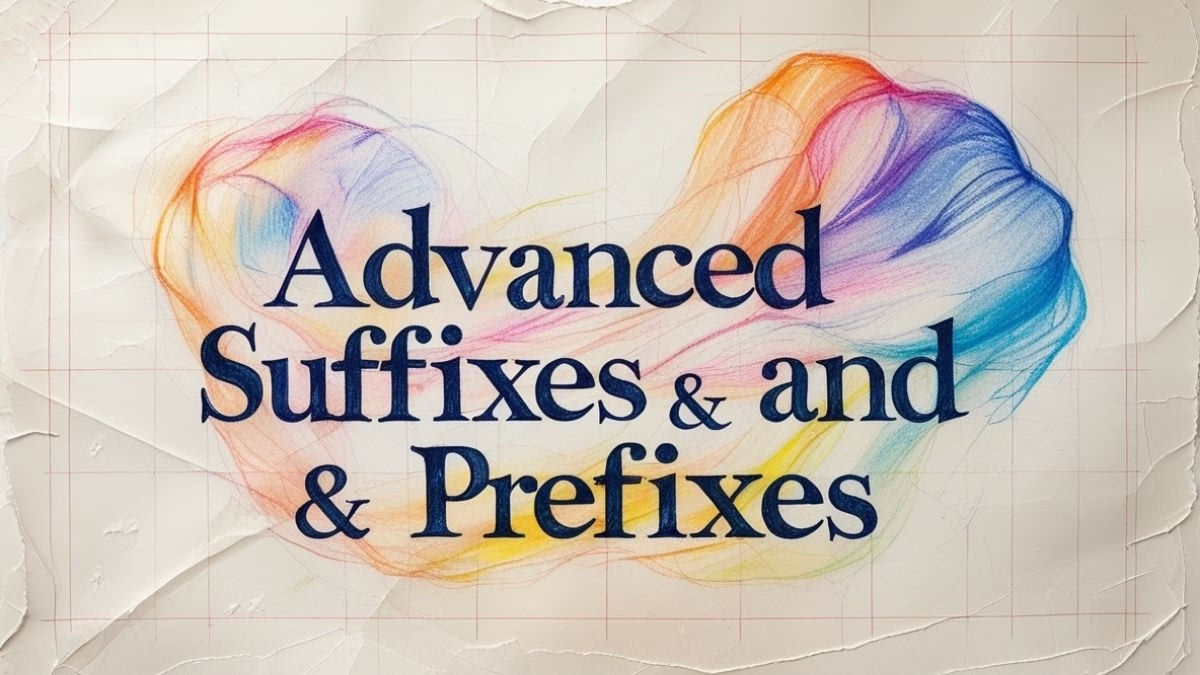Audio Episode
[ppp_patron_only level=5]
[/ppp_patron_only]
Introduction
Welcome to the Advanced Suffixes and Prefixes Quiz! Get ready to move beyond the basics of ‘un-‘ and ‘-ful’ and dive into the powerful particles that shape the most sophisticated words in English. This isn’t just a test; it’s an interactive workout for your vocabulary.
Why focus on prefixes and suffixes? Because they are the secret code of the English language. Once you understand them, you can deconstruct and understand complex words you’ve never seen before. This quiz is designed to help you:
- Learn in Context: You’ll see these advanced words used in natural, real-life sentences, helping you grasp their meaning and usage.
- Understand the “Why”: Through detailed hints and feedback for every single option, you won’t just learn the right answer—you’ll understand the logic behind it. We explain why the correct answer works and, just as importantly, why the other options don’t.
- Build Lasting Vocabulary: By engaging with these words interactively, you’re more likely to remember them and start using them confidently in your own speaking and writing.
Prepare to challenge yourself, decode complex language, and add a new layer of sophistication to your English skills. Let’s begin!
Learning Quiz
This is a learning quiz from English Plus Podcast, in which, you will be able to learn from your mistakes as much as you will learn from the answers you get right because we have added feedback for every single option in the quiz, and to help you choose the right answer if you’re not sure, there are also hints for every single option for every question. So, there’s learning all around this quiz, you can hardly call it quiz anymore! It’s a learning quiz from English Plus Podcast.
[ppp_patron_only level=5]
[/ppp_patron_only]
Quiz Takeaways
Hello and welcome! If you’ve just taken the quiz, I hope you found it challenging, engaging, and, most importantly, useful. If you haven’t, I encourage you to give it a try. Today, we’re going to build on what that quiz teaches us. We’re going to deconstruct the “secret code” of advanced English: prefixes and suffixes. Think of them as tiny building blocks, like Lego pieces. Once you know what each piece does, you can look at a huge, intimidating word and see it not as a solid wall, but as a structure you can easily take apart and understand.
Let’s start with prefixes, the little units that come at the beginning of a word and change its meaning.
A key group of prefixes relates to position, direction, or opposition. In the quiz, we saw transnational. The prefix trans- means ‘across’ or ‘beyond’. So, a transnational company is one that operates across national borders. Think of transatlantic (across the Atlantic) or transport (to carry something across from one place to another). Its cousin, inter-, means ‘between’, like an interstate highway that runs between states. Then you have intra-, which means ‘within’. An intranet is a computer network within one company. See the power? Just by swapping that prefix, you completely change the meaning from ‘between’ to ‘within’.
We also saw prefixes of opposition. In question #2, you had to choose between empathy, apathy, sympathy, and antipathy. The key was understanding the prefixes. Anti- means ‘against’. If you have an antipathy towards something, you have a strong feeling against it. A- often means ‘without’. Apathy is the state of being without feeling or interest. The correct answer, empathy, uses em-, which means ‘in’ or ‘within’. It’s the ability to feel as if you are in someone else’s shoes. This is more profound than sympathy, where sym- means ‘with’. Sympathy is feeling with someone, often feeling sorry for them, while empathy is feeling what they feel.
Another powerful pair of opposite prefixes are ex- and in-. In the quiz, we had the legal terms exculpate and inculpate. The root here is culpa, which is Latin for ‘blame’. Ex- means ‘out of’. So, to exculpate someone is to take them out of the blame. The defense attorney wants to exculpate their client. The prefix in- can mean ‘into’ or ‘upon’. To inculpate someone is to put the blame onto them. That’s the prosecutor’s job. Just knowing ex- means ‘out’ and in- means ‘in’ can help you unlock dozens of words. Think inhale and exhale, interior and exterior.
Let’s also look at prefixes of time or order. We had the word progressive in question #9. The prefix pro- means ‘forward’. A progressive leader moves the company forward. The opposite is regressive, where re- means ‘backward’. A regressive policy would take things backward to a previous state. This pro- vs re- pattern is a useful one to know.
Now, let’s switch to the end of the word: suffixes. Suffixes are amazing because they usually tell you the function of a word. They tell you if it’s a noun, a verb, an adjective, or an adverb.
Consider the suffixes that form nouns. In question #1, the answer was demagoguery. That -ery suffix often indicates a practice, a behavior, or a place of business. Think of robbery (the practice of robbing) or bakery (the place where a baker works). In question #11, the answer was austerity. That -ity suffix is a classic noun-forming suffix that indicates a state or quality. Austerity is the quality of being austere. Others include clarity (the quality of being clear) and vivacity (the quality of being vivacious). In question #13, we had marginalia. The -ia suffix often denotes a collection or a condition, often with a Latin feel.
Then we have suffixes that create adjectives. These are incredibly useful for descriptive writing. In question #15, we had to choose between several words ending in -ous. The suffix -ous means ‘characterized by’ or ‘full of’. A specious argument is one characterized by being misleading. A voracious reader, from question #19, is one who is full of a desire to read. Other examples are courageous (full of courage) and poisonous (full of poison).
Another interesting adjective suffix is -esque, which means ‘in the style of’. A picturesque village looks like a picture. A kafkaesque situation is bizarre and illogical, in the style of the author Franz Kafka.
Some suffixes turn words into verbs, indicating an action. The suffixes -ify and -ize are the most common. They both mean ‘to make’ or ‘to become’. For example, to clarify is to make something clear. To modernize is to make something modern. In question #4, we had the verb amalgamate. While -ate can also be an adjective or noun suffix, here it functions to create a verb meaning ‘to make into a single unit’.
Finally, let’s talk about the words themselves. The quiz was designed not just to test prefixes and suffixes, but to introduce you to a higher level of vocabulary. Words like abstruse (difficult to understand), fortuitous (a lucky accident), and conciliatory (intended to pacify) are all words that can make your English sound more precise and sophisticated.
Notice how abstruse is a better choice than “hard to understand” in an academic context. See how specious is more precise than “a fake argument” because it specifically means something that looks good on the surface. And understanding polarized as a description of a group is different from ambivalent, which describes an individual’s internal conflict.
Mastering these words, and the prefixes and suffixes that build them, is a journey. The goal isn’t to memorize a dictionary. The goal is to develop an instinct. The next time you see a word like ‘circumlocution’, you might not know it. But if you know circum- means ‘around’ (like circumnavigate) and that locu- relates to speech (like eloquent), you can guess it means ‘talking around a point’. And you’d be exactly right.
That is the true power you gain. You’re no longer just learning words; you’re learning the system behind the words. Keep practicing, stay curious, and continue to break down the language you see around you. You’ll be amazed at how quickly your vocabulary and comprehension skills grow.










0 Comments